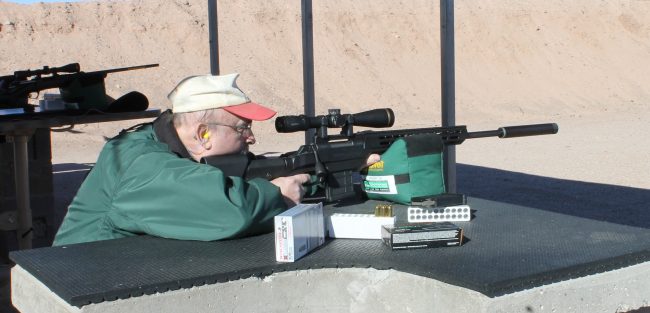By Dave Workman
Senior Editor
At the annual Shooting, Hunting and Outdoor Trade (SHOT) Show in Las Vegas, there was considerable discussion about the recently introduced National Hearing Protection Act, a piece of legislation that would remove suppressors (aka “silencers”) from regulation under the National Firearms Act.
It was a piece of legislation recommended by Alan Gottlieb, founder and executive vice president of the Second Amendment Foundation, in an Op-Ed published by various newspapers.
“Pass a National Hearing Protection Act,” Gottlieb wrote. “Sound suppressors/silencers are designed to protect hearing. Congress should remove the red tape, and make them easy to own. It would benefit shooters at indoor ranges, and those whose outdoor ranges have seen encroachment of nearby development. They can also be used for hunting to reduce noise conflicts.”
Anti-gunners are having fits over this. Steve Chapman, writing in the Chicago Tribune, observed:
“The proposal horrifies gun control advocates, who see it as a favor to homicidal maniacs. The Violence Policy Center in Washington argues that silencers pose a grave danger to public safety because they ‘enable mass shooters and other murderers to kill a greater number of victims more efficiently.’”
However, according to Chapman, and confirmed independently by a retired agent with the Bureau of Alcohol, Tobacco, Firearms and Explosives who worked gun crime cases all over the map, suppressors are so rarely used in crime that it is virtually unheard of.
Chapman quoted a study in the Western Criminology Review that could find “only two federal court cases involving the use of a silencer in a murder between 1995 and 2005.”
The retired agent, who had risen in the ATF ranks, told TGM via telephone, “In 27 years with the agency, never in that time did myself…or police officers I worked with recover a silencer used in a violent crime.”
Steve Sanetti, president of the National Shooting Sports Foundation, said in his annual report on the State of the Industry dinner, “I personally hope for the passage of the Hearing Protection Act, both as a public service to hold down the noise and not disturb our neighbors near shooting ranges, but also to help preserve what little hearing I have left!”
Gun prohibitionists will fight this effort, not because it genuinely poses a threat to the public, but because they simply will not admit they may be wrong, and they don’t want to see any expansion of firearms rights, proponents predicted. That includes continued development and wider use of devices that make shooting more enjoyable and perhaps more acceptable.
De-regulating suppressors so they are more available to the public without lots of bureaucratic hoops and a $200 tax is a political loss for gun prohibitionists. Ironically, the gun control invariably complains about the uncompromising “gun lobby,” but when it comes to stubborn resistance to reform, anti-gunners are first in line.




